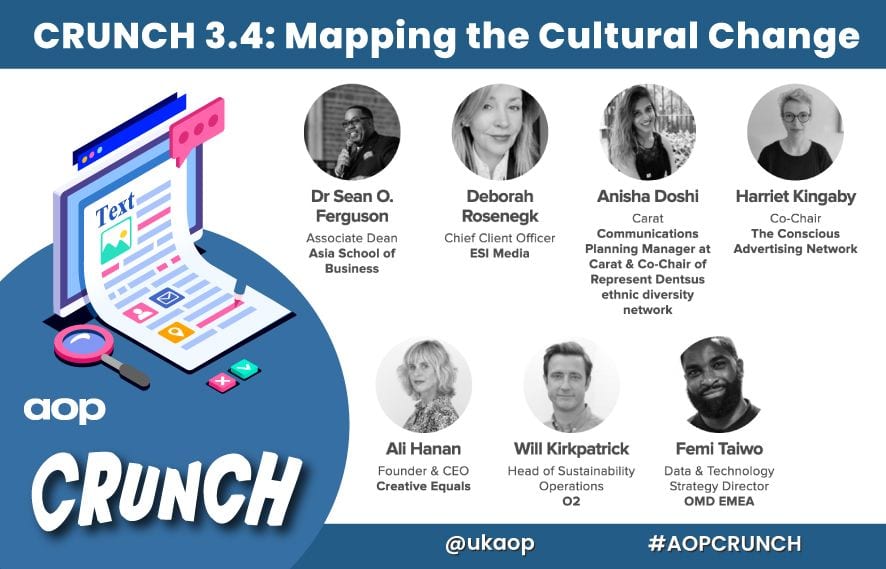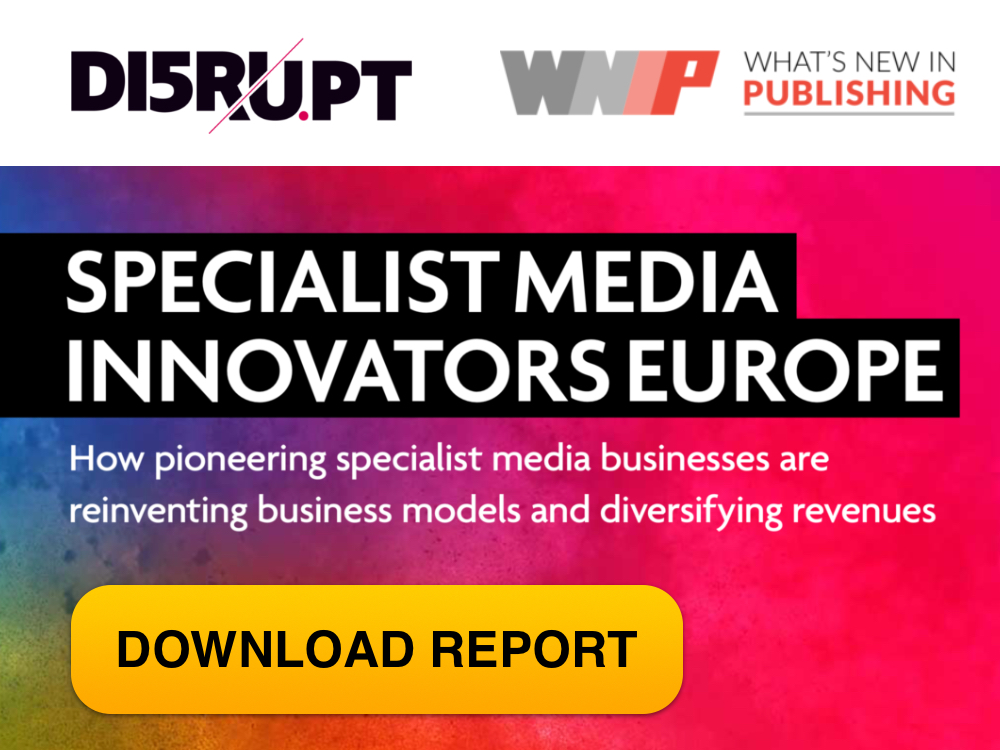|
Getting your Trinity Audio player ready...
|
The importance of purpose is now a given. The pandemic has sparked a pivotal shift in wider societal issues and movements, and it’s become clear the industry must set out and stick by core values to keep pace with the growing tide of cultural evolution, at every level.
But this is just the beginning of a much bigger journey. We’ve recognised the need for more ethical action and greater diversity and inclusion. The next step is determining how all digital media players can move beyond phase one — aligning with the causes consumers care about — and start work on permanently recalibrating the entire ecosystem.
While there aren’t necessarily any quick fixes, leading thinkers from publishers, brands, agencies, and academia have plenty of ideas about where the focus should be to fuel enduring sustainability, fairness, and innovation.

Here are five key factors our participants selected at the latest AOP Crunch session: ‘Mapping the cultural change’.
- Nurturing tomorrow’s leaders
To build a brighter future, the industry must set its sights on attracting the leaders who will soon take up the baton of enhancing digital media quality and equality. For Dr Sean O. Ferguson, Associate Dean at the Asia School of Business, that requires a deep understanding of the group that will make up most of tomorrow’s leaders: Generation Z.
This cohort has only known a world rocked by financial crisis and COVID-19, where ‘jobs for life’ no longer exist. Consequently, what its budding leaders want is different from their predecessors. As Ferguson notes, Gen Z is gravitating to companies that “embrace and embody conscious capitalism” by contributing positively to society and the planet. To meet these expectations, companies will need to ensure they are not only truly purpose-driven, but also able to demonstrate strong conscious culture, enabled by ethical leaders.
- Building talent diversity
When it comes to building today’s teams, there is rising awareness that stronger inclusivity and diversity is paramount; and not just in terms of better representation. Gathering people with different skills, perspectives and experiences will produce digital media that forms more meaningful connections with varied communities, be it ads or editorial.
Before this can be achieved, however, there are key hurdles to address. Studies cited by Ali Hanan, Founder and CEO of Creative Equals, indicate publishing and advertising still have a tendency towards homogeny that can create bias and blind spots.
To harness the innovation, creativity and success that diverse teams fuel, rectifying this imbalance is vital. As well as implementing measures to make organisations welcoming, inclusive and safe spaces for all workers, Hanan stresses it’s important to provide clear career pathways and prioritise hiring mixed talent. This sentiment is echoed by Femi Taiwo — Data & Technology Strategy Director for OMD EMEA —who believes in cultivating richer talent pools by actively seeking diverse candidates and framing recruitment processes around what individuals can do, instead of who they are.
- Tying principles to profits
Illustrating the commercial incentive for ethics will be a game-changer in fuelling industry traction. Will Kirkpatrick, O2’s Head of Sustainability Operations, points out there is rising recognition that responsible action is both good for business and winning the trust of customers, investors, and partners. Taking this further and underlining the tangible value it generates will help significantly bolster momentum across organisations.
Approaches recommended by Kirkpatrick include using econometrics to trace direct links between ad spend on cause-focused campaigns and return on investment (ROI); thereby enabling marketers to showcase profitability and win senior-level buy in. But the broader opportunity lies with uncovering and leveraging more areas where moral and business cases can meet. Or as summarised by Anisha Doshi — Communications Planning Manager at Carat and Co-Chair of Dentsu’s ethnic diversity network Represent — understanding that “doing the right thing and capitalism don’t have to be mutually exclusive.”
- Staying true to values
Authenticity may already be high on every company’s radar but the challenge is to keep it there. In a climate where ‘badging’ is no longer enough, businesses must make sure they show real dedication to key values by embedding them at the centre of overall strategy, instead of isolated corporate social responsibility (CSR) programmes.
Deborah Rosenegk, Chief Client Officer at ESI Media, feels a large part of this is consistency. Citing the Evening Standard as a prime example, Rosenegk argues what has made the publication stand out is the way it persistently spotlights and supports the issues that matter to readers; including raising funds of £50 million for London over the last decade.
But another core element is collective effort. For Taiwo, working with other agencies has been instrumental in advancing OMD’s goals to reduce the carbon footprint of online advertising, especially data centre emissions. To meet bigger industry objectives — such as the Advertising Association’s (AA) newly launched Ad Net Zero mission for production and media placement — true commitment to ongoing collaboration is essential.
- Committing for the long haul
Just because the industry is undergoing rapid upheaval doesn’t mean companies should aim to change everything on an immediate basis. All speakers agree the best way to realise lasting change is through continual and considered development, rather than reactionary initiatives propelled purely by what’s happening right now — as Taiwo puts it: appreciating that we might have “reached a flashpoint, but it is not a flash in the pan”.
This will involve a mix of introspection and long-range planning. As well as taking an honest look at current practices, organisations must build a realistic roadmap for the activities needed to get where they want to be in 10 or 20 years, instead of only the next 18 months. In particular, it’s worth heeding Doshi’s advice not to “discount the impact of incremental changes happening over a long, consistent period of time”. For example, Carat is striving for sustainable progress by tackling major challenges one at a time: including reviewing the blocklists inadvertently cutting clients off from positive inclusive content and limiting revenue for diverse publishers by avoiding terms such as “gay”, ‘black”, “Muslim” and ‘transgender”.
Reconfiguring digital media is a bold ambition that’s going to take time, cooperation, and a lot of patience. Publishers, brands and agencies will have to remain flexible and willing to keep listening, testing, and learning.
While it’s not always easy to live by fundamental values, it’s critical to remember that as an industry, we have huge influence over the way people think, behave and act. This means it’s our responsibility to use that influence with intention and purpose.
In the words of Hanan: content must “represent the society we live in and what we want it to become.”
Richard Reeves
Managing Director,
Association of Online Publishers (AOP)



